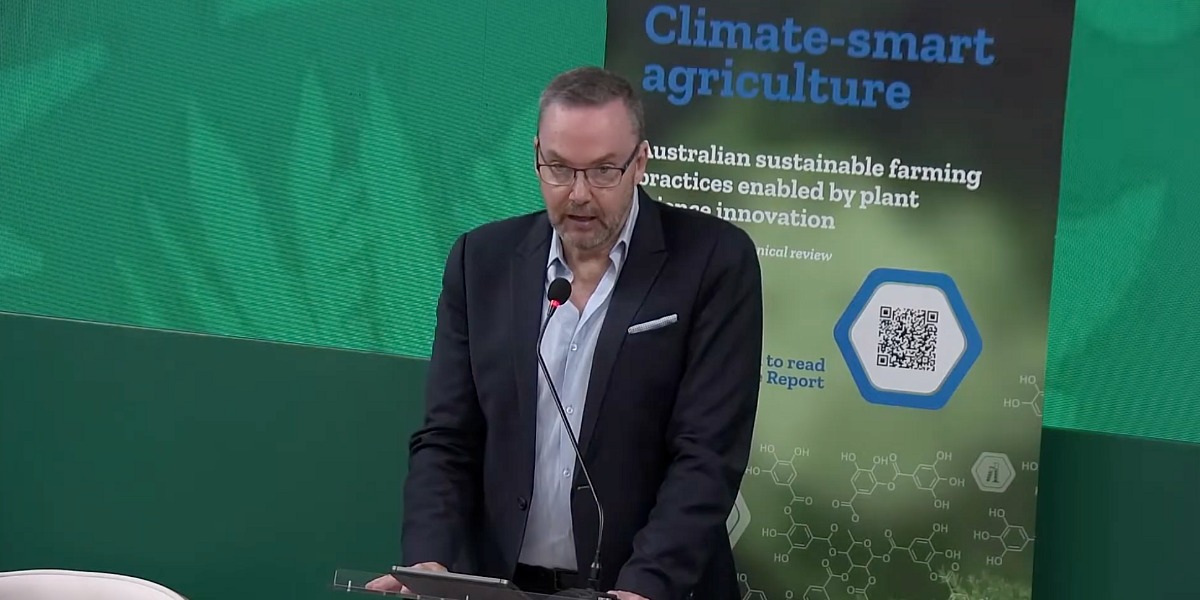Australian farmers have been confirmed as the world’s leading climate-smart producers, with a landmark independent review released at COP30 showing they are delivering some of the strongest sustainability outcomes on Earth.
The report Climate-smart agriculture: Australian sustainable farming practices enabled by plant science innovation – An independent technical review, released at the COP30 summit in Brazil this week, draws on peer-reviewed science, national data and industry case studies. It concludes that Australia’s farm sector has the lowest emissions intensity among major exporting nations, with emissions for Australian produce up to 42 per cent lower than peer countries. Agricultural emissions have dropped 20 per cent over 30 years while output has risen 60 per cent.
Additionally, more than 90 per cent of Australian crops are now grown using minimum or no-till systems, a shift that has improved soil structure, increased organic matter and boosted water retention. Water efficiency has surged across major commodities, with cotton improving water productivity by 40 per cent in a decade, and grain water-use efficiency rising 60 per cent to return $5.60 for every $1 invested.
CropLife Australia chief executive Matthew Cossey said the findings reflect decades of science-led adaptation to a challenging climate.
“Australia’s farmers have long been among the most resource-efficient growers and producers in the world,” Mr Cossey said.
“Operating in one of the most variable and challenging climates of any major agricultural nation, they have consistently adopted science-based innovations that lift productivity while safeguarding land, water and our unique biodiversity.”
“Their success has been underpinned by science, innovation and stewardship: adopting new technologies and practices that drive yield gains, enhance resilience, improve sustainability and protect the environment.”
The release of the report comes as a pointed contrast to the Coalition’s renewed push to abandon Australia’s net zero commitments and revert to older policy settings that significantly threaten productive farmland.
The tension is heightened by the government’s decision to proceed with deep cuts to the CSIRO, with 350 full-time roles to be abolished as part of a major restructure affecting food, agriculture, biosecurity and environmental science units. The agency says funding has failed to keep pace with the rising cost of operating a modern scientific institution and that it cannot remain financially sustainable without job losses.
It is not yet known how many jobs will lost from the CSIRO facilities in the region, particularly the Myall Vale cotton research facility near Narrabri, and the Chiswick agricultural research centre between Armidale and Uralla.
CSIRO chief executive Doug Hilton said difficult decisions were necessary to secure the long-term future of the organisation.
“As today’s stewards of CSIRO, we have a responsibility to make decisions that ensure we can continue to deliver science that improves the lives of all Australians for generations to come,” Dr Hilton said.
Industry and Innovation Minister Tim Ayres said the agency needed to position itself for the future.
“It is obviously a difficult time for the organisation, but with prioritisation, from a government that believes in our national science institution and its capacity to serve the national interest, that is a necessary process, and I support them working their way through those questions,” he said.
Nutrition research is among the confirmed areas to be cut, despite its success as an income generator for the agency and the global popularity of the CSIRO Total Wellbeing Diet. Farm Online has reported that a unit specialising in food and agriculture, biosecurity and environmental research will bear the brunt of the reductions.
Over the past 18 months, 818 CSIRO roles have already been lost. CSIRO Staff Association secretary Susan Tonks warned the consequences would be widespread.
“These are some of the worst cuts the CSIRO has ever seen,” Ms Tonks said.
“We don’t need a crystal ball to know these cuts will hurt – they’ll hurt families, farmers and our future.”
Got something you want to say about this story? Have your say on our opinion and comment hub, New England Times Engage

